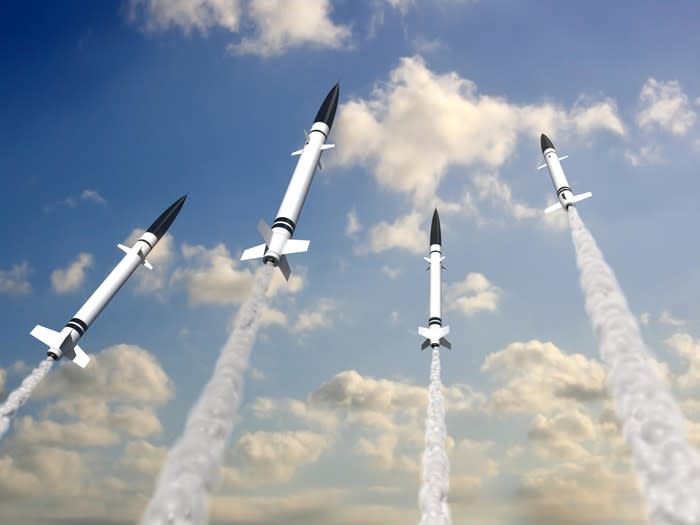America's 4 Rocket Companies Compete for High-Stakes Air Force Contract
Were you shocked in June when SpaceX sued the U.S. Air Force for awarding its rivals more than $2 billion worth of rocket development contracts and giving SpaceX nothing?
Were you amazed that SpaceX had seemingly turned on one of its biggest customers? You shouldn't have been. After all, SpaceX has done this before.
And now, it's time to really hold onto your seats folks, because this next news is truly jaw-dropping:
SpaceX's space-faring rivals have just begun filing lawsuits ... over contracts that haven't even been awarded yet.

Image source: Getty Images.
4 rocket companies, 2 contracts -- that's a problem
Two months ago we were talking about preparatory contracts. The U.S. Air Force awarded three of America's four main "rocket companies" -- Northrop Grumman (NYSE: NOC), Boeing and Lockheed Martin's United Launch Alliance (ULA) joint venture, and Blue Origin (but not SpaceX) -- money to help pay for the development of rockets that would perform the next batch of contracts.
Utilizing this funding, Northrop would continue developing its OmegA heavy-lift vehicle, ULA would continue work on its Vulcan Centaur, and Blue Origin would make progress on its New Glenn large rocket. Then each of these companies would bid its respective rocket (against competing rockets from SpaceX) in the hopes of winning even more money to actually launch payloads into orbit with it.
It's this second stage of the contracts process -- dubbed "Launch Service Procurement" -- that's at issue today.
Over the course of five years, running from 2022 through 2026, the U.S. government intends to hire only two of these four space companies to launch as many as 34 national security payloads into orbit, splitting the orders 60-40. The two losing space companies will get no launches at all. And that's where the problem arises:
What good is it, after all, getting a bit of a government subsidy for your rocket, if once it's built they're not going to buy it?
Blue Origin objects
Now, not everyone's upset with this arrangement. Convinced that they're going to win the two contracts available, the government's incumbent national security launch providers, ULA and SpaceX, quickly put out optimistic press releases. ULA touted its Vulcan Centaur rocket as "purpose-built ... for the U.S. Air Force's Phase 2 Launch Services competition." SpaceX pointed out that its Falcon 9 and Falcon Heavy launch systems are "existing, certified and proven," and said it "means to serve as the Air Force's long-term provider for space launch."
Jeff Bezos's Blue Origin, on the other hand, issued something a bit different: A "pre-award" protest filed with the Government Accountability Office, alleging that the Air Force's "acquisition strategy for the National Security Space Launch program" is "flawed" and "includes evaluation criteria that are ambiguous and fail to comply with federal procurement statutes and regulations."
According to Blue Origin, the Air Force's insistence on choosing only two winners will leave the other two bidders out in the cold, and indeed, lock them out of the government launch market for the five-year duration of the Launch Service Procurement (LSP). By that point, starved for work, they may no longer be in business to bid on any new contracts coming down the pike. (The Air Force also plans to cut off payments under the earlier, $2 billion-plus Launch System Prototype contract to any company that fails to win an LSP contract.) Blue Origin also worries that the Request for Proposals (RfP) under LSP says it will seek out the rockets offering the "best value" -- but doesn't explain how that will be determined.
Perhaps most crucially, though, Blue Origin objects to the RfP's requirement that bidders name a "backup rocket" that they would use to launch payloads if something went wrong with their primary rocket. SpaceX has at least three rocket models to mix and match as "primary" and "backup" -- the Falcon 9, Falcon Heavy, and the upcoming Starship. ULA has the Vulcan Centaur in development, but could presumably also build new Atlas V and/or Delta IV rockets if something went wrong with Vulcan. Northrop is bidding the OmegA for LSP instead its venerable Antares rocket, but it would still have the smaller Antares to fall back on.
Blue Origin, however, has only New Shepard, a tiny suborbital rocket designed for space tourism, undergoing testing today, and the New Glenn in development. In other words, it has no backup vehicle to offer at all.
Why this matters to investors
To the Air Force's way of thinking, that shouldn't be an insurmountable obstacle. If it loses the LSP bidding, Blue Origin can just ... find itself some commercial launch customers! Then bid again on the next batch of national security launches five years from now. The problem, of course, is that during those five years, the companies that win LSP will be courting those very same commercial customers for additional business, and doing so with the imprimatur of a "USAF-approved" label on their rockets.
In short, this game really does appear to be rigged to favor the Air Force's incumbent providers, ULA and SpaceX. That might be good news for investors, who can take some assurance that Boeing and Lockheed -- both publicly traded, and both co-owners of ULA -- should remain safe investments under the RfP as presently formulated. However, for taxpayers hoping to reap savings from increased competition in the space market, and for anyone hoping to get a chance to invest in a post-IPO Blue Origin, the news has to come as a disappointment.
In just a few years, there may nothing left of Blue Origin to IPO.
More From The Motley Fool
Rich Smith has no position in any of the stocks mentioned. The Motley Fool has no position in any of the stocks mentioned. The Motley Fool has a disclosure policy.
This article was originally published on Fool.com

 Yahoo Finance
Yahoo Finance 